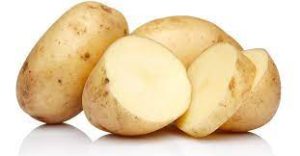P is for … Potato
 My wife laughs at me. I really don't understand why. When I'm asked what is my favourite vegetable, there can be only one answer - today's hero, the potato. Not only do I fail to comprehend why that's remotely amusing, I genuinely find it difficult to see why anyone would make another choice.
My wife laughs at me. I really don't understand why. When I'm asked what is my favourite vegetable, there can be only one answer - today's hero, the potato. Not only do I fail to comprehend why that's remotely amusing, I genuinely find it difficult to see why anyone would make another choice.
My grandson would probably say broccoli, but he's only 4: he'll grow out of it. For any fully grown adult with normal intelligence, why on earth would you want to pass over the earthly delights which the so called humble spud can offer? A pile of fluffy, buttery mash; glorious, warm, reeking, rich dauphinoise, all cream and garlic; the sharp crispy exterior and soft fluffy centre of a perfectly roasted specimen; a pack of impossibly hot, salty chips, the perfect companion on a late night walk home. I could go on.
It's extraordinary to think that here in Europe we have had these delights for only some four centuries. They come originally from Peru and Bolivia. The oldest confirmed evidence comes from around 2500 BC, but they can probably trace their roots (yes, pun intended, sorry) back about 10,000 years. We chauvinist Brits believe that it was Sir Walter Raleigh who first brought them across the Atlantic, but the Spanish, probably Pizarro, got there 50 years ahead of us. We adapted the Spanish name, batata. Confusingly, that was their name for the ghastly sweet potato. The two are nowhere near as closely related as you might think.
By the time Raleigh found them, they had got as far north as modern day USA, the state which Sir Walter named Virginia, after the virgin queen, and where he also picked up tobacco. No great surprise that his twin discoveries caused confusion. In fact the potato took quite a long time to become the staple food which it is today. It is related to the nightshade. For decades many believed it to be poisonous, and eating green ones isn't the best of ideas.

Parmentier
In addition to that, someone started the rumour that eating potatoes would cause leprosy. Fake news isn't new. Enter another famous P, one Antoine-Augustin Parmentier. Serving as a pharmacist in the French army during the Seven Years' War (1756 - 63) he was captured by the Prussians. Prisoners were largely fed on potatoes, then considered as fit only for animal feed.
On his release he continued research into the beneficial and nutritional value of the potato. Largely due to his efforts, in 1772 the Paris Faculty of Medicine declared the potato to be edible. Our A-AP was clearly something of a showman, as he didn't stop there. He held a series of banquets where the spud was the principal ingredient, and he presented the king and queen with bouquets of potato flowers. He posted armed guards around some potato patches by day but withdrew them at night. People reckoned the potatoes must be incredibly valuable, and stole them. If on a French menu you see a dish with the name Parmentier in the title, (and there are many) it will be potato based. I was delighted to learn that his grave in Père Lachaise cemetery in Paris is ringed with potato plants.
Probably the world's most famous potato dish is the fried version. Do you call yours chips, French fries, frieten or just fries? The origins are unclear. Many claim that they hailed from Belgium. What is certain is that street traders operating in Paris near one of the bridges were cooking fried potatoes which they called pommes Pont-Neuf. We also know US President Thomas Jefferson sampled them, and that they were served at a dinner in the White House in 1802.
I'm pausing now, partly in awe at the myriad delights which are possible using the potato. It is occurring to me that I could fill the Tom Cooks! column for the rest of the year without repetition. In my kitchen just now we are savouring the delights of new potatoes, simply boiled and served with butter and salt. As ever, a few unanswerable questions. Does anyone else share my view that if every single potato sold as a Jersey Royal did indeed emanate from that little island it would have to be four times its actual size? (Stick with Ayrshires, that's my advice.) Name me one famous Chinese potato dish. No, I couldn't either. So why is it that China is responsible for about 20% of the world's production?
 And one final piece of trivia. Some of you or your kids may have played with a toy called Mr Potato Head? A plastic head with interchangeable eyes, nose, mouth, facial hair etc. Invented in 1949, this was the first toy ever to be advertised on television. OK. That's me done. Time, I think, for a beer and a bag of crisps.
And one final piece of trivia. Some of you or your kids may have played with a toy called Mr Potato Head? A plastic head with interchangeable eyes, nose, mouth, facial hair etc. Invented in 1949, this was the first toy ever to be advertised on television. OK. That's me done. Time, I think, for a beer and a bag of crisps.
Well Tom you have surpassed yourself this time. I enjoyed it very much. I whole heartily agree with you on the Jersey Royals. In fact I never ever buy them. I wait for the tasty Cornish potatoes and then pig out if I can on Ayrshire tatties. On my return to Scotland on the 3rd I will be buying Ayrshire tatties no later than the 4th. 👍 Also I immensely dislike sweet potatoes 🥔
Thanks, Robert.
How on point you are Tom.
My Irish Folklore Calendar says that the 29th June is the Feast of St. Peter and Paul and also the day to dig and taste the first of the new spuds.
We like to be topical.
You’re sooo right, Tom. While I do love most vegetables, the potato is the one that needs to be there all the time. And a “pile of fluffy, buttery mash” is my favourite food.
Fine lady, you are.